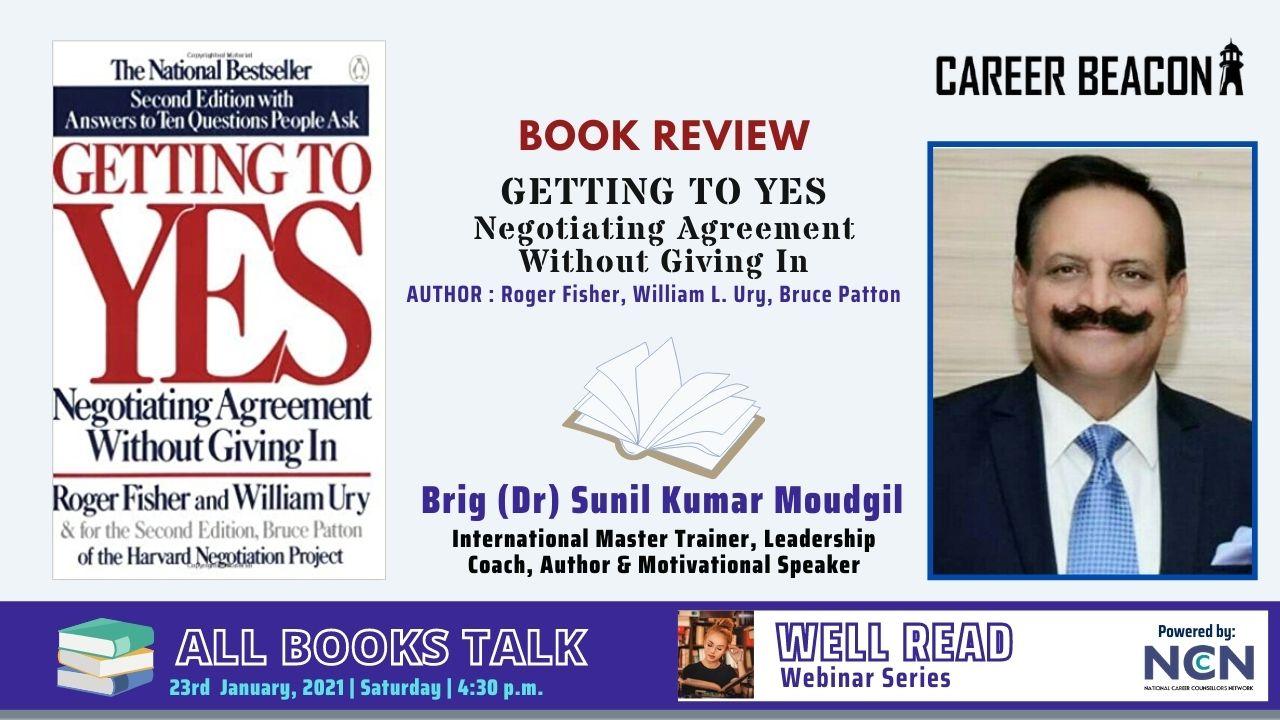
Getting to Yes
A Book by Roger Fisher & William Ury.
Brig(Dr) Sunil Moudgil (Retd) shared his experience after reading this book, how it impacted him and his audience.
Like it or not, we are all negotiators. Negotiation is a fact of life. You discuss a raise with your boss. You try to agree with a stranger on a price for his house. Two lawyers try to settle a lawsuit arising from a car accident. A city official meets with union leaders to avert a transit strike. All these are negotiations.
Everyone negotiates for something every day. You deal with the spouse for dinner and with your child about when the lights go out. Negotiation is a primary means of getting what you want from others. It’s back-and-forth communication designed to reach an agreement.
Although Negotiation takes place every day, it is not easy to do well. Standard strategies for Negotiation often leave people dissatisfied, worn out, or alienated – and frequently all three.
People find themselves in a dilemma. People generally follow two ways to negotiate: soft and hard. The smooth negotiator wants to avoid personal conflict and so makes concessions readily to reach an agreement. He or she wants an amicable resolution; yet often ends up exploited. The formidable negotiator sees any situation as a contest of wills in which the side which takes the more extreme positions and holds out longer fares better. He or she wants to win; yet often produces an equally hard response that exhausts the negotiator and his or her resources and harms the relationship with the other side.
Another way to negotiate is neither too hard nor too soft, but rather both hard and soft. The method is known as ‘Principled negotiation’, developed at the Harvard Negotiation Project. It decides issues on their merits rather than through a haggling process. The method of principled negotiation is hard on the prices, soft on the people. It employs no tricks and no posturing. Principled Negotiation shows you how to obtain what you are entitled to and still be decent. It enables you to be fair while protecting you against those who would take advantage of your fairness.
Anyone can use this method. Principled Negotiation is an all-purpose strategy.
Three criteria may fairly judge any method of Negotiation:
- It should produce a wise agreement if an agreement is possible
- It should be efficient
- It should improve or at least not damage the relationship
Principled Negotiation (or Negotiation on merits) works on four main steps:
- People: Separate the people from the problem: Why? Because people have 3 Basic Problems, i.e., Perception, Emotion and Communication.
- Interests: Focus on parts, not on positions. Why? Because when people take roles their ego gets attached and then face-saving comes in a case, they have to change jobs.
- Options: Generate a variety of possibilities before deciding what to do. Invent options for mutual gain.
- Criteria: Insist that the results be based on some objective standard.
The participants should see themselves as working side by side, attacking the problem, not each other.
There are three stages to Principled Negotiation:
- Analysis: Try to diagnose the situation.
- Planning: Plan and come up with additional options and additional criteria.
- Discussion: Communication and Negotiation back and forth, looking toward an agreement
Does the book also talk about how to deals with certain situations like What if they are more powerful? What if they will not play?What if they use dirty tricks?
BATNA – Best Alternative to a Negotiated Agreement – develop it for every Negotiation and keep it close.
- Invent a list of actions you might conceivably take if no agreement is reached
- Improve some of the more promising ideas and convert them into practical alternatives
- It was tentatively selecting the alternative that seems best.
- The better is your BATNA, the greater your power. Each side’s relative negotiating ability depends mainly on how attractive to each is NOT reaching an agreement.
- Consider the other side’s BATNA: if theirs is so good they do not see any need to negotiate on the merits, consider what you can do to change it.
The ability to negotiate requires a collection of interpersonal and communication skills to bring the desired result.
We recommend for those who wish to have win win situation to buy


